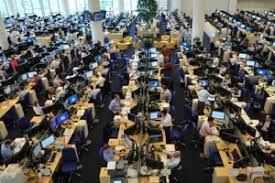Bringing Employees Back to the Office? Make Sure There are Enough Desks
July 5, 2022
Not many days go by without news from electric vehicle maker Tesla making waves online. And since one of the most important current issues facing organizations and HR leaders is navigating the new ways of working – fully remote, hybrid, or in some cases, fully back to in-person work at company locations, it is not surprising that Tesla’s, and more specifically CEO Elon Musk’s take on the subject and return to office plan has become a major story.
You likely saw reports a few weeks ago where Musk indicated that Tesla’s “office” based workforce, which had been largely working remotely or in a hybrid schedule between offices and home, were directed to begin to report back to Tesla locations for, according to Musk, “a minimum of 40 hours per week.” Musk made it clear that remote or hybrid work would no longer be acceptable at Tesla, and employees affected by this change in policy could either comply or seek employment elsewhere.
Fast-forward a few weeks since this pronouncement, and it seems like all is not going well with the Tesla return to work location plan. Namely, returning workers are finding that Tesla locations were not equipped or prepared for a rapid, widespread return to workplaces by employees.
According to reports, several Tesla workers who prefer to remain anonymous stated that they couldn’t find desk space at the corporate offices in Tesla’s Fremont complex. Some also said the WiFi was too weak for them to work at the office.
Parking was also in short supply as more workers returned. Some workers at the plant were forced to park offsite, and take company provided shuttles into the Fremont factory location. In fact, the space issues were so disruptive that some managers at the facility instructed employees to come in fewer than five days a week due to space – a direct conflict to Musk’s return-to-offices mandate.
Long story short, the early stages of Tesla’s return-to-workplace policy is not going well. And it harkens back to March of 2020, when many organizations were forced to rapidly pivot to remote working, usually without an associated remote work strategy, set of policies, and tools and technologies to make remote work successful for the organization and for employees. Eventually, most organizations and people figured it out.
But it was a process, and a reminder that for any organization that desires to bring all or most of their workforce back to the office, commensurate strategies, policies, and technologies need to be in place for their return to office plan – BEFORE forcing everyone back into a scene like at Tesla, with employee fighting over desks, bandwidth, and parking spaces. All the while wondering just why they’ve been forced back in the first place.
How we can help
Led by Trish Steed and Steve Boese, H3 HR Advisors harnesses over 40 years of experience to delivery HCM insights and guidance to global organizations.
H3 HR Advisory services
By leveraging technology, analytics, and our deep industry knowledge we can help you to reposition your workforce and ensure that you have the right people with the right capabilities in the right roles to positively impact the growth of your business.
HR Happy Hour Podcast Network
Created in 2009, The HR Happy Hour Show is hosted by Steve Boese and Trish Steed and is the longest continuously running internet radio show and podcast on Human Resources, HR Technology, Talent Practices, Workplace and Leadership topics.
H3 HR Speaking Services
We work closely with every client to customize your content - keynotes, webinars, research, infographics, and buyer’s guides - to inspire, educate and inform the audience enabling you to reset and realign your organization for a talent-led breakthrough.
Get in touch
Talk to us today and find out how we can help you and your organization leverage HCM technology to attract, onboard, retain and manage top talent.




